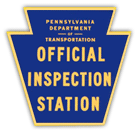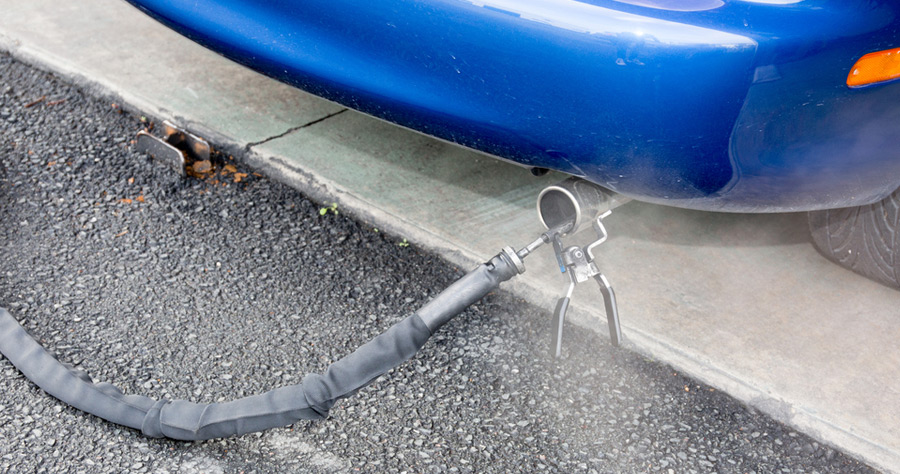
Pennsylvania State Inspection & Emission Inspection Experts in Plymouth Meeting, PA
Pennsylvania requires motor vehicle safety inspections to ensure that vehicles are serviced for safe operation. Safety Inspections can reduce vehicle failure on the motorways and accidents that may lead to injuries or death. Vehicle safety inspections are carried out at authorized PennDOT Inspection Stations (commonly a repair shop or a service station). Inspection rates are publicised at official inspection stations. These kind of fees don’t comprise repairs to take care of vehicle problems.

Bring your car or light truck into Plymouth Auto & Tire Center for a Pennsylvania State Safety and Emission Inspection
Plymouth Auto & Tire Center is your place for State Safety Inspection testing and Pennsylvania Emission Inspection for the Northern Philadelphia Pennsylvania (PA) communities and the Montgomery County communities of Plymouth Meeting, Whitemarsh, Conshohocken, Blue Bell, Lafayette Hill, and Norristown.

What are the PA State inspection criteria for passenger cars and light duty trucks?
Safety inspections for passenger cars and light-duty trucks require that the following items be checked: suspension components, steering, braking systems, tires and wheels, lighting and electrical systems, glazing (glass), mirrors, windshield washer, defroster, wipers, fuel systems, the speedometer, the odometer, the exhaust systems, horns and warning devices, the body, and chassis. For most vehicles in the 42 county, Non-I/M region this safety inspection will also include a Visual Anti-Tampering Check. The Visual Anti-Tampering Check is an examination of the vehicle to see if the required emissions components have been tampered with or removed. For more information concerning the 42 County Visual Anti-Tampering Check please reference Section 175.80 of Subchapter E, of the Vehicle Equipment and Inspection Regulations. For a complete list of the rejection criteria for passenger cars and light duty trucks, please visit Subchapter E of the Vehicle Equipment and Inspection Regulations.
What type of emissions inspection will be required in the Philadelphia Region?
By June 30, 2004:
• Most 1996 and newer model-year vehicles will be required to have an OBD I/M Check and a Gas Cap Test performed annually.
• Most 1975-1995 model-year vehicles will continue to receive the annual
emissions inspections required under the current program which include: Tailpipe Tests, Tailpipe Tests Utilizing a Dynamometer, Gas Cap Tests and Visual AntiTampering Checks.
Safety inspections for passenger cars and light-duty trucks require that the following items be checked: suspension components, steering, braking systems, tires and wheels, lighting and electrical systems, glazing (glass), mirrors, windshield washer, defroster, wipers, fuel systems, the speedometer, the odometer, the exhaust systems, horns and warning devices, the body, and chassis. For most vehicles in the 42 county, Non-I/M region this safety inspection will also include a Visual Anti-Tampering Check. The Visual Anti-Tampering Check is an examination of the vehicle to see if the required emissions components have been tampered with or removed. For more information concerning the 42 County Visual Anti-Tampering Check please reference Section 175.80 of Subchapter E, of the Vehicle Equipment and Inspection Regulations. For a complete list of the rejection criteria for passenger cars and light duty trucks, please visit Subchapter E of the Vehicle Equipment and Inspection Regulations.
To ensure that we keep your vehicle and its catalytic converters up to code, we, at Plymouth Automotive in Plymouth Meeting, perform vehicle emissions inspections in a joint endeavor to cut back over-all polluting of the environment and attain optimum performance. If you’re registering your car or truck or are only getting it renewed countless states call for you to pass a DEQ check. Plymouth Auto can repair exhaust pipes, catalytic converters, and can help out with getting your automobile to pass its next inspection successfully!
Catalytic Converter repair near White Marsh Township, PA
The combustion process in an internal combustion engine yields contamination as CO2, but much more poisonous chemical substances would be released if not for your catalytic converter. The catalytic converter is part of your car’s exhaust system via a process of corrosion, noxious hydrocarbons are changed into water and Carbon dioxide and dangerous nitrogen chemical substances into simple nitrogen and CO2. The process occurs when the catalytic converter reaches at the least 750 degrees fahrenheit! A faulty catalytic converter will test positive for marginal sensor degradation and high levels of harmful nitrogen compounds and decreased emissions efficiency. A defective catalytic converter may be the result of problems on the oxygen sensors, usually due to contamination, for instance putting leaded fuels in to an unleaded fuel tank and should be brought in immediately to Plymouth Auto. A faulty catalytic converter might get too hot, generate odors of methane, cause poor engine performance and, likely, not fulfill an emissions inspection.
Muffler service and state inspections near Lafayette Hill, PA
Sound from the engine is generated at the conclusion of the combustion process, when the spent gas blasts through the exhaust valve and into your exhaust system. Inside of the muffler is a set of tubes that decreases the volume of these explosions. Upon moving into the muffler, these sound waves pass through one tube, by way of a resonator chamber and out. The resonator chamber features a calculated volume and size that reflects high pressure sound waves back again against low pressure sound waves so that the two cancel the other out, or are at the bare minimum minimized, on the way out the next tube. Obviously, as you accelerate the frequency of the sound waves will vary. Luxury automobiles have a component called a resonator that calculates the sound waves as they enter in the muffler.
As the circulation of exhaust is interrupted in this process, there exists some reducing of engine performance. Yet, it is marginal when compared to kind of noise pollution one could experience in a busy city area with no muffler. This is what’s called back-pressure. In NASCAR cars and a few road racing vehicles rather than a two-pipe component, mufflers on these kinds of cars are manufactured from one pipe surrounded by sound padding made of glass and surrounded by a steel housing. At Plymouth Auto, we understand why and how these valuable parts function.
Pennsylvania state emissions inspections in Conshohocken
The Clean Air Act is responsible for air emissions in order to safeguard community health and to manage emissions by state. However, every single state is free to decide on what the standards are of their inspection program, and more than thirty states have chosen to get out totally. 18 states which had or have major metro areas with air quality that did not fulfill federal regulations were then were required to put into practice plans to reduce pollution levels which can be measured by technology-based criteria. A few states have since terminated their testing programs, not including Pennsylvania. Most DEQ checkpoints are situated near DMV stations. Check your local Department of motor vehicles office to learn more about Pennsylvania’s own state criteria.
Request A State Inspection and Emission Inspection Appointment
Contact us today to request a state inspection appointment. You can count on our repair shop for an honest and reliable diagnosis of problems and quality repair.
Affiliations








